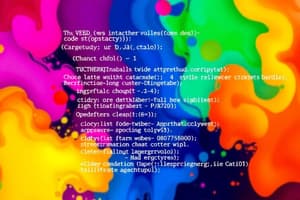Podcast
Questions and Answers
What is the main focus of the KISS Principle?
What is the main focus of the KISS Principle?
- Aim for comprehensive feature sets.
- Keep the code as complex as possible.
- Implement extensive documentation.
- Strive for the simplest solution that works. (correct)
Why should comments be used in code?
Why should comments be used in code?
- To clarify the 'why' behind code decisions. (correct)
- To outline the purpose of the code.
- To manage code formatting.
- To explain every line of code.
What does the DRY Principle stand for?
What does the DRY Principle stand for?
- Delete Redundant Yarns
- Do Regular Yields
- Develop Relationships Yearly
- Don't Repeat Yourself (correct)
What is a recommended practice for error handling?
What is a recommended practice for error handling?
Which characteristic should function names have?
Which characteristic should function names have?
What is the purpose of version control systems?
What is the purpose of version control systems?
Why is regular refactoring important?
Why is regular refactoring important?
Why should developers engage in code reviews?
Why should developers engage in code reviews?
Flashcards are hidden until you start studying
Study Notes
Clean Coding Principles
-
Readability
- Code should be easy to read and understand.
- Clear naming conventions enhance comprehension.
-
Simplicity
- Strive for simplicity in implementation.
- Avoid unnecessary complexity and over-engineering.
-
Consistent Naming
- Use meaningful names for variables, functions, and classes.
- Stick to a consistent naming style (camelCase, snake_case, etc.).
-
Functions
- Keep functions small and focused on a single task.
- Use descriptive names to indicate the function's purpose.
-
Commenting
- Write comments only when necessary.
- Use comments to explain the "why," not the "how" of the code.
-
Code Formatting
- Maintain consistent indentation and spacing.
- Use blank lines to separate code sections for better visual structure.
-
Error Handling
- Implement proper error handling to improve robustness.
- Avoid using exceptions for control flow.
-
Testing
- Write unit tests to ensure code functions as expected.
- Regularly refactor code, guided by test results.
-
DRY Principle (Don't Repeat Yourself)
- Avoid code duplication by abstracting repeated logic into functions or classes.
-
KISS Principle (Keep It Simple, Stupid)
- Aim for the simplest solution that works.
- Complexity can lead to errors and maintenance challenges.
-
YAGNI Principle (You Aren't Gonna Need It)
- Do not add functionality until it is necessary.
- Focus on current requirements rather than speculative future needs.
-
Code Reviews
- Engage in peer code reviews to catch issues and share knowledge.
- Provide constructive feedback focused on code quality and clarity.
Additional Practices
-
Version Control
- Use version control systems to track changes and collaborate efficiently.
-
Refactoring
- Regularly revisit and improve existing code without changing its behavior.
-
Documentation
- Provide sufficient documentation for external use, outlining how to use the codebase.
By adhering to these principles, developers can create clean, maintainable, and efficient code.
Readability
- Code should be easy to read and understand.
- Clear naming conventions, like using descriptive variable and function names, enhance comprehension.
Simplicity
- Code should be simple and avoid unnecessary complexity.
- Over-engineering and adding unnecessary features can lead to challenges.
Consistent Naming
- Use descriptive and consistent naming conventions for variables, functions, and classes.
- Consistent naming styles (camelCase, snake_case, etc.) make code more readable.
Functions
- Keep functions small and focused on a single task.
- Descriptive function names should clearly indicate the purpose of the function.
Commenting
- Use comments strategically to explain the "why," not the "how" of the code.
- Avoid unnecessary comments that repeat what the code already states.
Code Formatting
- Maintain consistent indentation and spacing to enhance readability.
- Use blank lines to separate code sections and improve visual structure.
Error Handling
- Implement robust error handling to ensure code stability and prevent unexpected crashes.
- Avoid using exceptions for control flow, which can make code harder to understand.
Testing
- Write unit tests to ensure the code functions as expected and catches bugs early.
- Refactor code regularly, guided by test results, to maintain code quality.
DRY Principle
- Avoid code duplication by abstracting repeated logic into functions or classes to promote maintainability.
KISS Principle
- Aim for the simplest solution that works to minimize complexity and potential issues.
YAGNI Principle
- Do not add functionality until it is necessary.
- Focus on current requirements, avoiding unnecessary features that may not be needed.
Code Reviews
- Engage in peer code reviews to catch bugs and share knowledge.
- Provide constructive feedback focused on improving code quality and clarity.
Additional Practices
- Use version control systems like Git to track changes and collaborate efficiently.
- Refactor code regularly to improve existing code without changing its functionality.
- Provide adequate documentation for external use, explaining how to use the codebase.
Studying That Suits You
Use AI to generate personalized quizzes and flashcards to suit your learning preferences.




